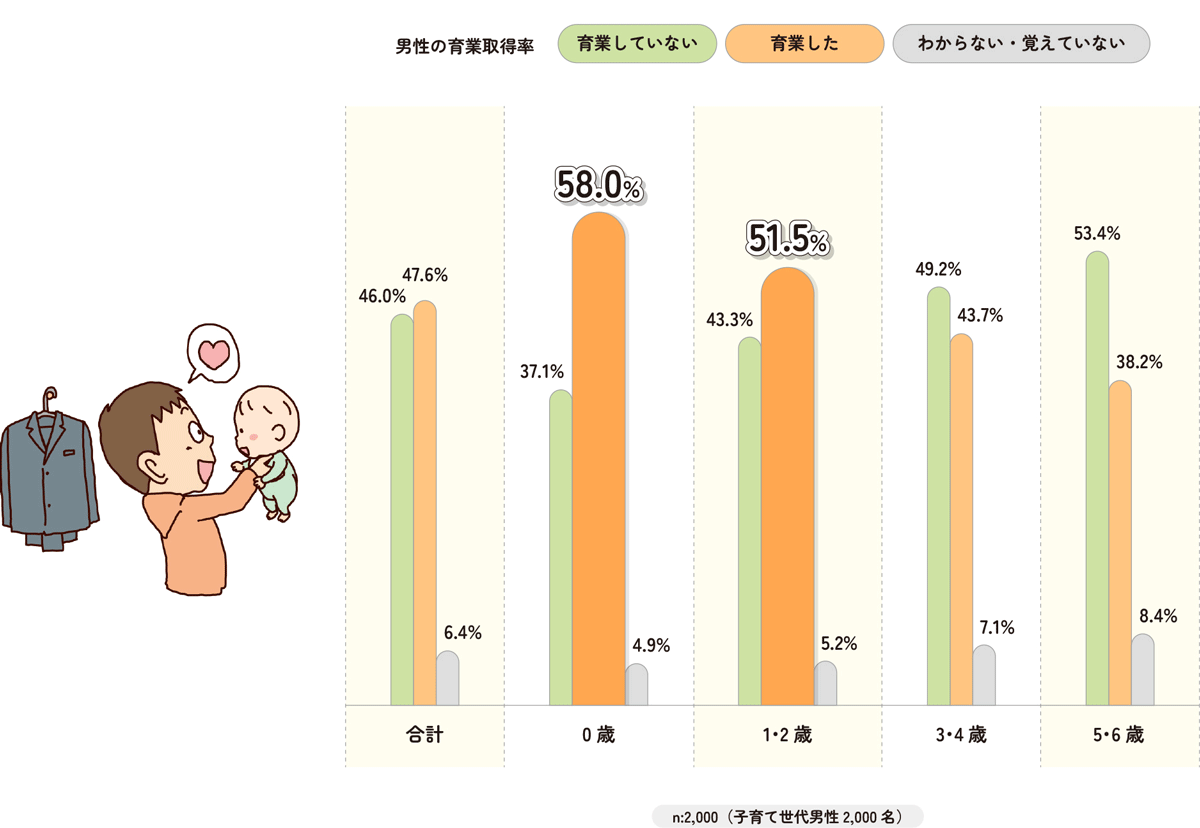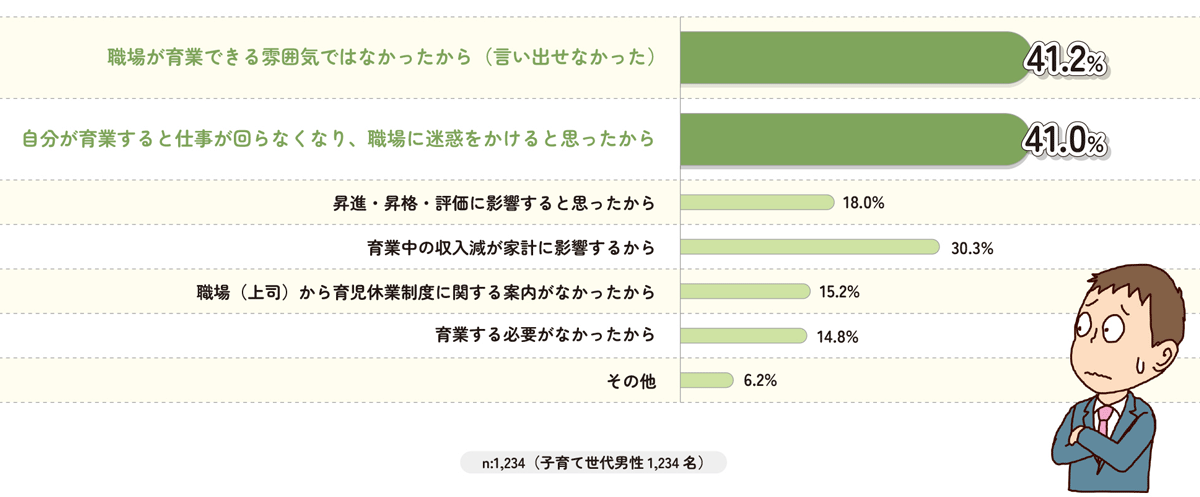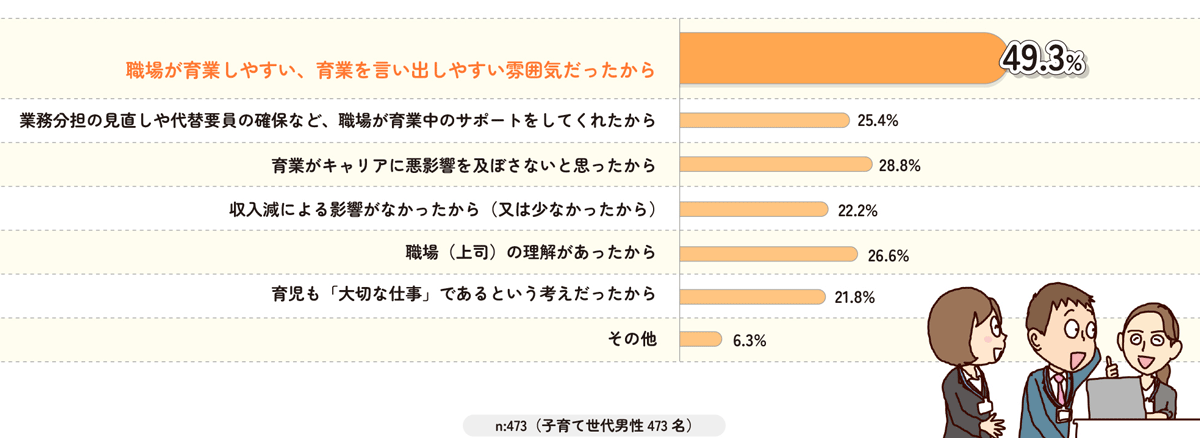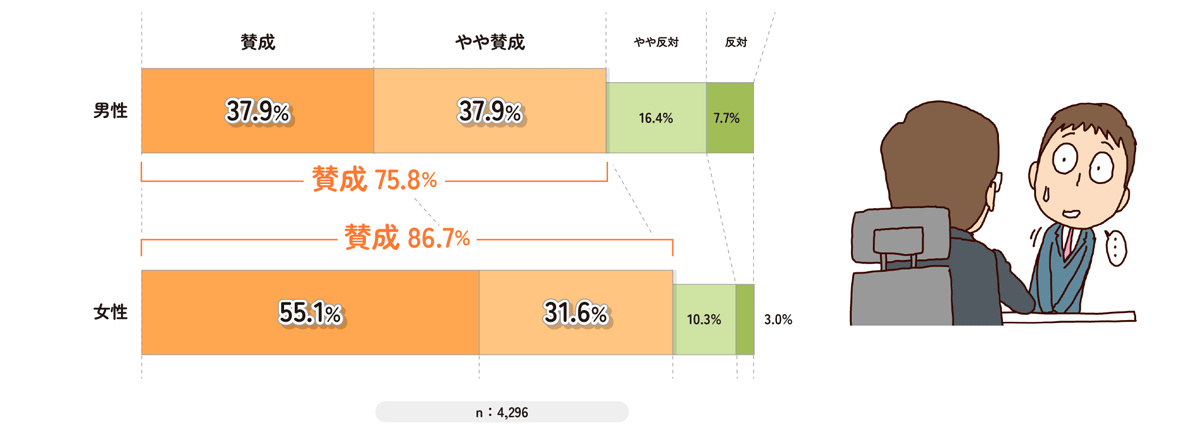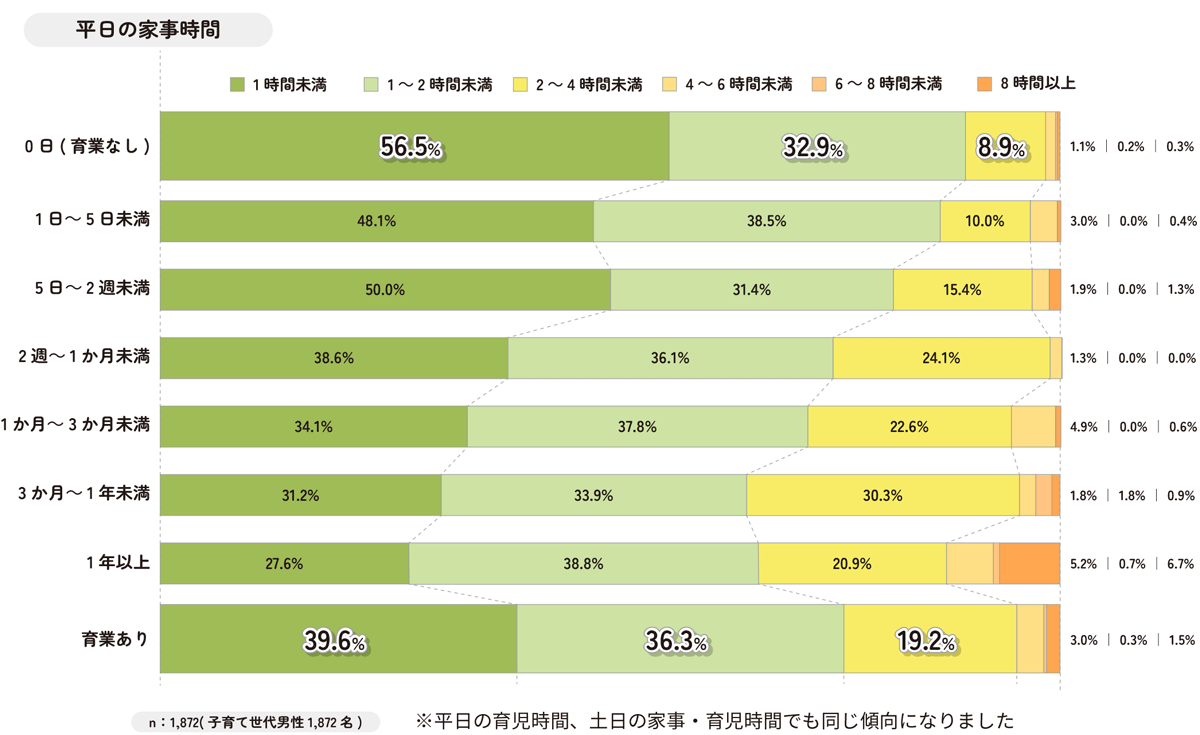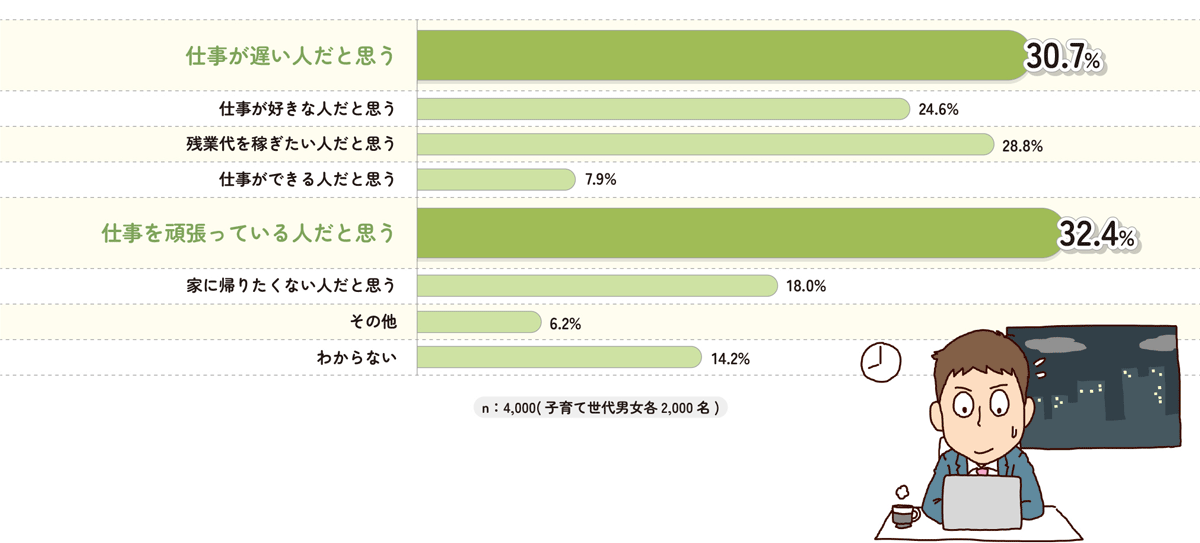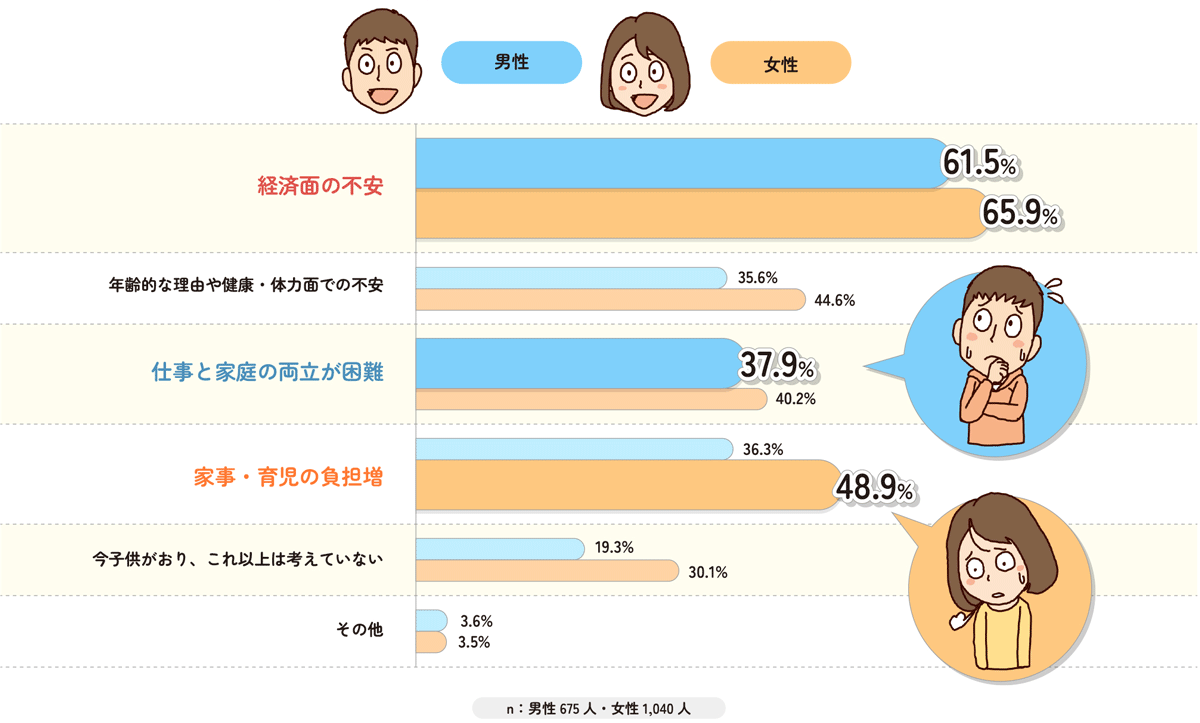![Survey of Men's Housework and Childrearing 2023] Part 2: Toward a society in which](/hp/wp-content/uploads/2024/02/ttl-top.png)
The Tokyo Metropolitan Government conducted a survey of 5,000 men and women living in Tokyo regarding housework and childcare. With the cooperation of experts, we have unraveled the differences in awareness and true feelings between men and women regarding housework and childcare, as well as the actual state of childcare. We will send you this report in three parts, along with a few words of advice that you can start using today!
The second issue will focus on men’s childcare and overtime work.
- Part 1: What do moms and dads really want and complain about in their daily lives? Click here
- Click here for “Part 3: Keys to Increasing Marital Satisfaction
More than 90% of the respondents are in favor of 3! Male childcare will change the family! Society will change!
(1) 58% of fathers of 0-year-olds take childcare leave! Childcare Work Increasing Year by Year
Q. Did you (male) work as a childcare worker?
The results show that more than half of the fathers of 0-2 year olds are engaged in childcare! It would seem that male child care work has become the norm over the past few years. On the other hand, there is also an equal percentage of those who have “0 days (no childcare work)” as a result of ……. There are still some issues that remain to be addressed.
In order to avoid “taking childcare leave just to take it,” I would like both mother and father to take a prenatal course offered by the local government and learn together why childcare is necessary in the first place, rather than just saying “I took it because the company recommended it. It is said that childbirth causes about two months of total damage, and postpartum mothers need a period of time to recover physically and mentally. Also, since even mothers are beginners at parenting, they need someone to start parenting with. That person is your partner, “you! And if the two of you do not start together, there tends to be a gap in your child-rearing skills. It is not that mothers are better at child-rearing because they are mothers, but it is the accumulation of experience that makes the difference, whether it is changing diapers, bathing, or carrying a baby. I believe that child-rearing is an important period that builds the shape of a family.

(2) “Workplace atmosphere” encourages fathers.
Q. Please tell us why you did not take up childcare or why your childcare period was shorter than you would have liked.
Q. Please tell us why you were able to take up childcare as requested or for a longer period of time than requested.
Many of the reasons given for not taking childcare leave or for the length of the leave being shorter than desired were due to the work environment, such as “I couldn’t say so” and “I thought it would cause trouble in the workplace. On the other hand, the overwhelming factor that encouraged fathers who were able to take childcare leave as they wished was “an atmosphere in which it is easy to take childcare leave and to ask for it. It would seem that the atmosphere in the workplace is an important point.
Some companies are trying to financially reward coworkers who may have an increased workload to cover for someone who is taking childcare leave by offering a congratulatory gift. To ensure that everyone can feel comfortable with childcare without any suspicion, we asked, “How do you feel about your coworkers taking childcare leave?” It is also a good idea to conduct an in-house survey and provide information that “it is okay to take childcare leave at our company as well. I think it will be easier to change the atmosphere by creating a mood in the entire workplace that the birth of a child = men should also take care of children and that it is a cause for celebration.

(3) More than 90% of the respondents are in favor of male childcare! When it comes to “myself”, I am reserved to my boss…?
Q. How would you feel if a man in your workplace decided to take up childcare?
Q. How do you think your boss would feel if you had to do childcare?
When “agree” and “somewhat agree” were combined, more than 90% of both men and women thought positively about men in the workplace taking part in childcare! The particularly high percentage of mothers may reflect their hearts’ desire for “more participation by fathers in childcare. However, when it comes time for them to take on childcare duties, the affirmative response drops significantly, and they seem to feel reserved or guilty about it. I would like to create a society in which people can proudly engage in childcare.
 Improve your management skills through childcare!
Improve your management skills through childcare!It may seem like a very good thing to say, “I can’t run without you” or “I have to do it myself,” but in order to go further, you have to learn management skills to successfully move others, not “I have to do it myself. I myself used to have a tendency to feel like I had to do everything myself, or to hold things up even if I had an assistant. But when you have a child, you have to manage research projects with less time available for work. Then they start delegating work to other people. I think for the company as well, employee training is a good opportunity to get rid of the “gentrification” of the work, where people think, “Only that person can understand that job.
4) Dads’ behavior changes! Experience in childcare makes a big difference in time spent on housework and childcare
Q. How much time do you (male) currently spend on housework and childcare?
A large difference in the length of time spent on housework and childcare was found between fathers who had and had not engaged in child care. Furthermore, the longer a father has been raising a family, the more time he spends on housework and childcare. It appears that those who have more experience devoting themselves to family affairs understand the difficulty of housework and childcare and take action.
Research shows that men who take on childcare have a life-changing impact on their lives. In Quebec, Canada, a study of the lifestyle of men who did childcare for an average of five weeks three years later found that the average daily time spent by men doing housework and childcare increased by 20%. If the starting point for childcare is a change in subsequent lifestyles, it is much more significant than people think.

You cannot become a party to anything unless you experience it. That is why it is necessary for fathers to do more and more childcare work, and to do housework and childcare together. Until now, there may have been days when you would say, “I’ll work a little more overtime and then go home,” but now that you have the experience, you will realize that “It’s too hard to go home alone if I don’t go home! and your lifestyle will change.

 Ideally, fathers and mothers should start childcare at the same time! A virtuous circle is created by fathers’ child-rearing
Ideally, fathers and mothers should start childcare at the same time! A virtuous circle is created by fathers’ child-rearingI think it is important to note that the survey results show that many men are supportive of men raising children. We often hear about the problem that it is difficult to participate in child care during the process, and if you fail to get in at the beginning, you will be left unable to participate in child care for years afterward. I would like you to understand more and more that this is an important time for you, a time when your position in the family could change. If it is your first child, both father and mother are amateurs in childcare. It is easier to start together, and the experience of going through a difficult time together strengthens the bond between the couple. In a Scandinavian study, it was reported that children’s academic performance improved slightly when fathers participated in housework and childcare. What is also known from various economic studies is that parents have a strong influence on the formation of children’s values. Children who grow up seeing their fathers raising children and their mothers working outside the home are better able to develop gender-neutral values. In this sense, it can have a positive impact on the child, and society’s values will change more and more, becoming less bound by a more gender-based sense of roles. I think male upbringing is very positive for society.
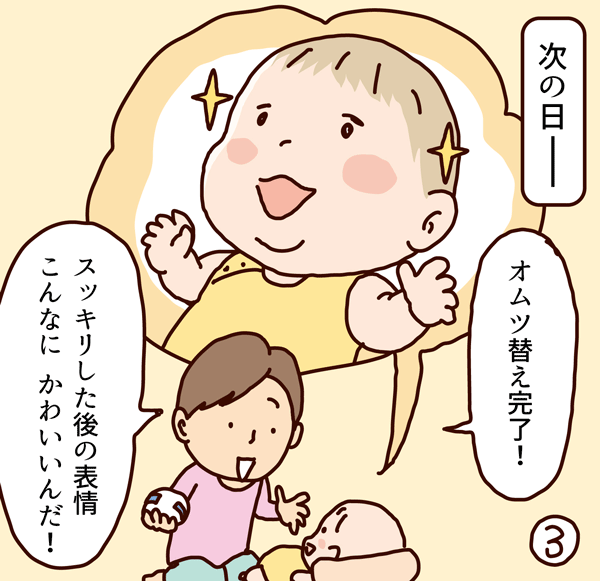
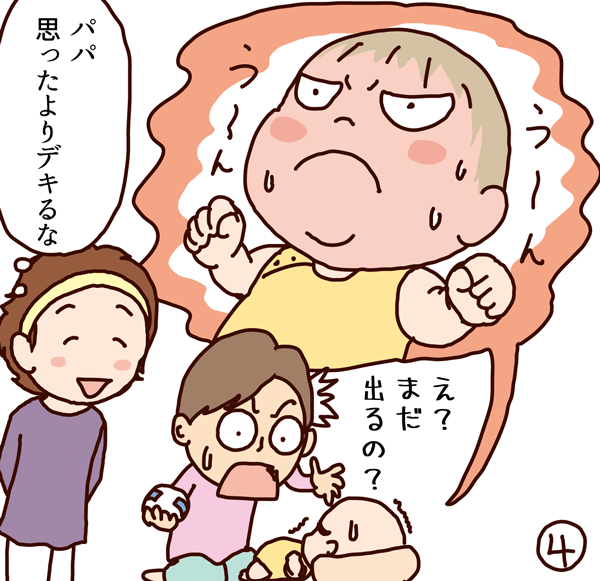
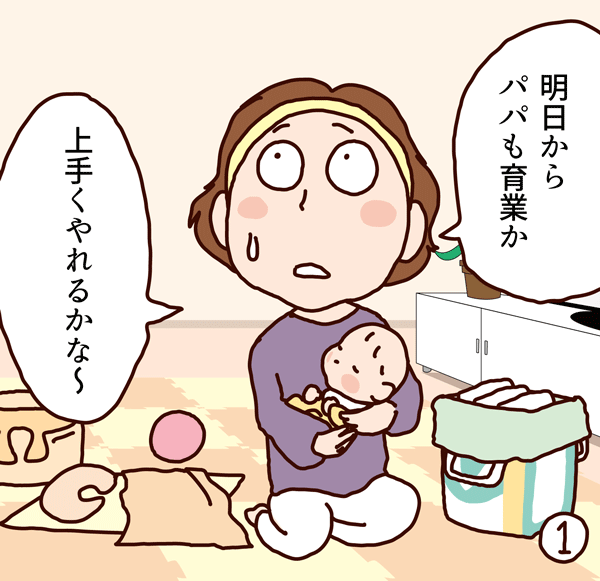

4. new normal! Going home on time” is a “good person” in both work and childcare.
(1) Go home on time and be a decent person!
Q. How do you feel about people who don’t work overtime and go home on time?
About 70% of the respondents answered that they would prefer to go home early if they could, and more than 20% said that they are “good at their job. The survey showed that many people are in favor of going home on time.
(2) People who work overtime = “people who work hard but work slowly”?
Q. How do you feel about people working late?
Some negative comments about those who work overtime include “I think you are a slow worker” and “I think you are someone who wants to earn overtime money,” even though they are working hard. …… It seems that overtime work does not always lead to good evaluations. On the other hand, the most earnest reason given for working overtime was that “workload and manpower are not in balance,” highlighting issues in the workplace environment.
It is important to know that working overtime is not always viewed positively by those around you. Also, some say that daring to leave work unfinished increases productivity. The idea is that you know exactly what you need to do the next day, so you can get into work with your engine running at full throttle from the start. It’s good for the family, it’s good for your own work efficiency, and it’s good for the company to have a high level of productivity. It’s a win-win situation for everyone, so please leave work unfinished and go home on time (laughs).

I think whether or not you can go home early is largely a matter of awareness. For example, if you get a ticket to your favorite artist, you will definitely go home that day, right? In other words, I think it depends on how conscious you are of the inevitability of having to go home. While raising children, “every day is a premier ticket. It would be a shame to miss seeing your child (children) grow day by day, or to miss your child becoming able to do something that he or she could not do yesterday!




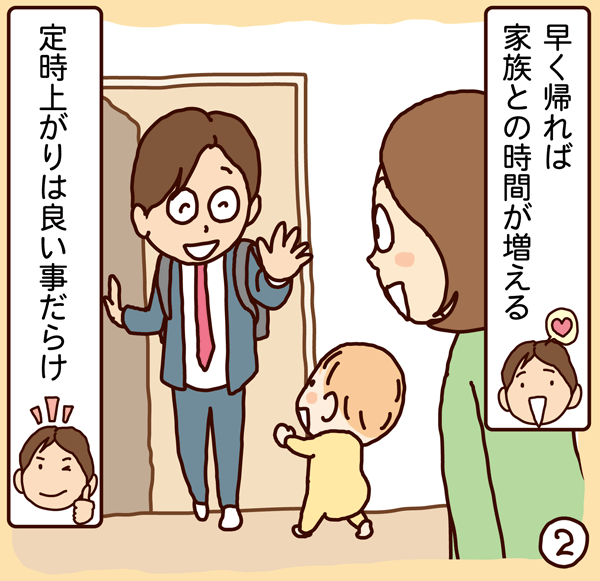
(3) Men’s housework and childcare will save the birthrate!
The survey also found that more than 60% of respondents (men and women 18-39 years old) answered that they would like to have more children in the future. On the other hand, nearly half of the women were concerned about the “increased burden of housework and childcare” as a reason or barrier for not wanting to have children. The path to resolving these concerns may be found by having men take on more of the housework and childcare responsibilities!

Q. What are your reasons for not wanting children and what are the barriers to having children?
Overseas studies have shown that fertility rates tend to be lower in countries where women bear a greater burden of housework and childcare. Digging deeper into the reasons for this, we found a situation where the burden of housework and childrearing is placed on the wife, and the wife feels that if she has another child, the burden will be even heavier only on herself. Japanese data also show that if the husband is involved in a lot of housework and childcare at the time of the birth of the first child, the percentage of births of the second child is very high.

In this third issue, we present the results of our survey on the importance of increasing satisfaction with the division of household chores and childcare, as well as the results of our survey on marital harmony. Please take a look!
- Part 1: What do moms and dads really want and complain about in their daily lives? Click here
- Click here for “Part 3: Keys to Increasing Marital Satisfaction
All survey results are available here.
Survey period: July 31-August 21, 2023
Target: 5,000 people (2,500 men and 2,500 women each) living in Tokyo Target 1 Child-rearing generation…4,000 men and women with preschool children (2,000 men and 2,000 women each) Target 2 All generations…1,000 men and women aged 18 to 69 (500 men and 500 women each)


